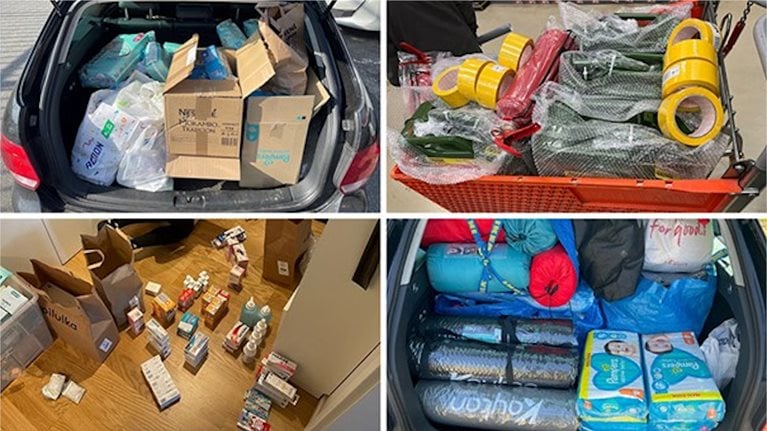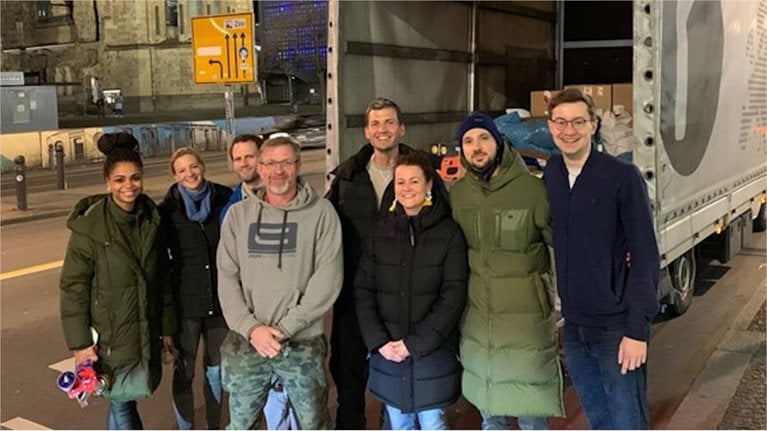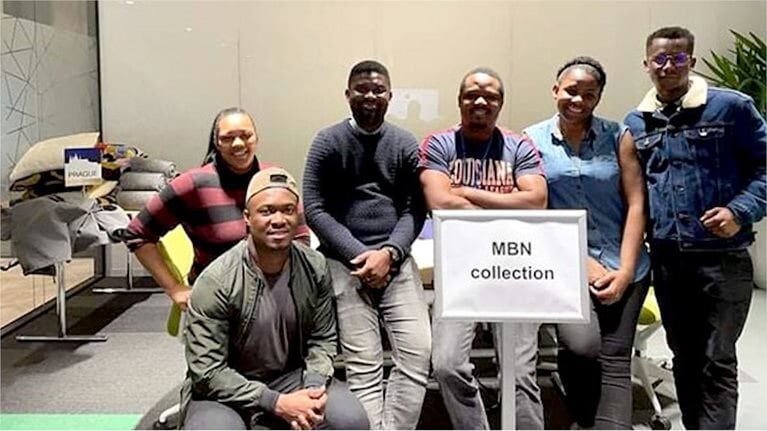
On the ground in Ukraine, humanitarian organizations are arranging transportation, providing food and shelter, and caring for the wounded. But even after those urgent needs are met, the work is far from over.
In addition to donating to nonprofits providing aid, McKinsey colleagues are stepping up to support others within our Firm, along with the broader community of those impacted by the war.
In Prague, home to many Ukrainian expatriate colleagues, a question kept circulating through the office when the war began: How can I help?
Oleksii Cheremisin, a Senior IT Project Analyst, worked with Tomas Kamarad, Director of Operations for the Prague office, to launch a local Slack channel and Box document to coordinate efforts across the office. The channel quickly grew, with more and more colleagues from not just Prague but also Brussels and Wroclaw joining to contribute.
“I knew there was a large Ukrainian diaspora in the Czech Republic, and I expected high involvement from that group,” Oleksii says. “But I was surprised to see so many colleagues who were not from Ukraine, who do not have family there, offering to help however they can.”

While Oleksii and others in the Slack channel have organized efforts to buy and send supplies to Prague’s Ukrainian Embassy, they have also drawn upon the unique skillsets and resources they can bring as individuals. Colleagues in neighboring countries have also gotten involved in the Slack channel, including a Brussels-based colleague who channeled his analytics capabilities and technical knowledge into launching an external site connecting Ukrainians in need with resources and people that can help.
Elsewhere in Prague, colleagues delivered needed goods to Ukrainian families staying in a local hotel, collected supplies for newborns for a local nonprofit helping Ukrainian mothers traveling to the Czech Republic, and prepared 120 welcome packages with food and basic necessities for Ukrainian refugees.
Solution Leader Dmytro Prosyanko, who moved from Ukraine to Dusseldorf, worked on a similar site, in combination with other local efforts to transport protective gear to the Ukrainian border and help settle refugees arriving in Dusseldorf.
“Everywhere I look, people are contributing in the ways they can,” he says. “Engineers are writing code to optimize logistics, and others are volunteering to ensure educational continuity for Ukrainian children sheltering in hotels. It’s 24/7, everyone is pitching in.”
Similarly, native Ukrainian speakers like Data Analyst Specialist Anatoliy Vojcechovskij have offered translation services for incoming evacuees to Prague. “I am Ukrainian but have lived in the Czech Republic for more than 10 years,” he says. “Looking a few weeks ahead, after more people are evacuated to different countries, we will need volunteers to help them adjust. Language translation to direct refugees to local services and assistance will be a big part of that.”
Outside of technical and language skills, colleagues in the region are also offering up their own homes, and even donating blood to treat the injured in Ukraine. In the Prague and Poznan offices, colleagues on-site have designated safe spaces for Ukrainian colleagues and their families, as well as those with family in Ukraine.
“We were inspired by the Poznań office, which first came up with this idea,” says Prague-based Communications Specialist Katerine Jureckova. “We provide food, beverages, some toys, blankets, pillows, Ukrainian-themed decorations (one colleague who is an artist will be donating some of her work to brighten the room), and we have the news running on TV.”
Colleagues in the Wroclaw office are working together to meet Ukrainian evacuees at the city’s train stations and get additional supplies to locals hosting refugees.
Elsewhere in Poland, multiple colleagues have opened their homes and volunteered at local centers. A group of colleagues even got together to welcome a young boy and his mother into a colleague’s home and gave them a memorable first birthday surprise. And in Warsaw, colleagues organized, and within 48 hours, shipped sleeping bags, food, medicine and other supplies to our colleagues and their families who were still in Ukraine.
In Madrid, colleagues donated essential items and an organized group traveled to the Ukrainian border to deliver materials and help refugees find transportation.
In Lisbon, colleagues are taking a formal approach to cultivating a sense of empathy and regard for mental health. A local team there, working with a nonprofit organization called ONG Sol Fraterno, has helped to provide mental health resources, in addition to medical care and supplies, to those affected by the war. “Unfortunately, the consequences of this war are expected to last, and we in Lisbon are committed to help however we can. We will find a way to keep this initiative alive and growing,” the Lisbon Social Responsibility Team says.
In Frankfurt, the office partners directly purchased an ambulance loaded with emergency medical supplies which was sent to Ukraine to aid those injured in the war. In our McKinsey Global Services location in Poznan, colleagues organized three themed collections of goods for refugees which are being sent to the Polish/Ukrainian border and distributed to refugees arriving in Poznan.

Meanwhile, in Berlin, the office has coordinated shelter for colleagues who have evacuated Ukraine and provide necessities for people still there. Early on March 1, Senior Partner Andreas Venus, who leads our Berlin Office, contacted colleagues to request volunteers and supplies from those able to help. Within a few hours, the impromptu team coordinating the supply run had not only checked off all the items on their list, but also sourced a truck and driver, mapped out a route by way of Warsaw, and sent the materials on their way.
After the truck was on its way, however, the work was still just beginning. Andreas added later, “We are now working with the rest of the German office and others to define the next set of actions.”
In Budapest, McKinsey Black Network (MBN) members from Prague, with support from the McKinsey Global Services team, have worked together to solicit donations for African students who were forced to flee Ukraine and are currently stranded in Hungary and Slovakia. With the help of a local NGO, members of the group gathered toiletries, food, blankets, and paper products and delivered them to the students.

In London, colleagues set up a collection point for donations, using a wish list provided by colleagues in contact with their Ukrainian family and friends.
The Firm contributes
The Firm is adding to the efforts of individual colleagues by dedicating time and resources. As announced on LinkedIn here, McKinsey has directly donated $2 million in cash to the International Committee of the Red Cross (ICRC). This contribution will support the ICRC's lifesaving and vital work to address the humanitarian impact inside and outside Ukraine's borders.
In addition to this $2 million donation, the Firm has now raised over $13 million through colleague contributions and matches.
McKinsey has also committed to pro bono efforts. Our Central European colleagues have multiple teams focusing on modeling refugee flows and management, refugee relief efforts, supply and demand management, and logistics support.
The team has already developed a blueprint for refugee center organization and is supporting information sharing at more than 30 train stations around the region. They will soon be helping with guidelines for how best to locate housing and job availability, schooling, and health care resources. The team is also deeply engaged in helping to understand and prioritize the humanitarian aid needs in Ukraine, helping to double aid volumes, and introducing a "fast-track" digital process for road cargo.